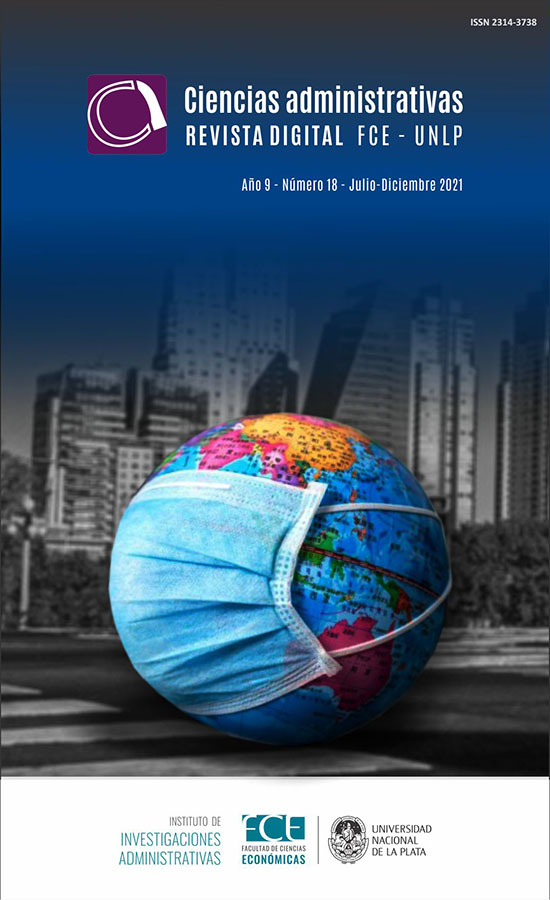Rethinking the Fourth Power Dimension: Organisational Subject and Culture Change
DOI:
https://doi.org/10.24215/23143738e086Keywords:
organizational studies, ethical subject, power, culture changeAbstract
This paper aims to rethink the view of the fourth power dimension, alongside the idea of the organisational subject and cultural change. This work is a theoretical review divided into six parts. The first section is an introduction regarding the discussion of power in the first three dimensions. The second part deals with the fourth power dimension. The third part reflects upon the ethical subject. The fourth section approaches the study of power in organisations, and the fifth part delves into the proposal of the organizational subject. The sixth part links the idea of the organizational subject to culture change. Finally, a series of reflexions are proposed about the possible ways to study the organisational subject.
Downloads
Metrics
References
Alvesson, M. & Sveningsson, S. (2016). Changing organizational culture: Cultural change work in progress. London: Routledge.
Arendt, H. (2017). La condición humana. México: Paidós.
Bachrach, P. & Baratz, M. (1962). Two face of power. The American Political Science Review, 56 (4), pp. 947-952. https://doi.org/10.2307/1952796
Bardon, T. & Josserand, E. (2010). A Nietzschean reading of Foucauldian thinking: constructing a project of the self within an ontology of becoming. Organization, 18(4), pp. 497–515. https://doi.org/10.1177/1350508410384758
Clegg, S. (1990). Frameworks of power. London: SAGE Publications.
Courpasson D. & Dany F. (2009). Cultures of Resistance in the Workplace. In S. R. Clegg & M. Haugaard (Eds.), The SAGE Handbook of Power (332-347). Inglaterra: editorial SAGE.
Crozier, M. & Friedberg, E. (1990). El actor y el sistema. México: Alianza.
Dahl, R. (1957). The concept of power. In Department of political Science (201-215). EUA: Yale University.
Deetz, S.; Tracy, S.; & Simpson, J. (2000). Leading Organizations Through Transition. Comunication and culture change. USA: Sage Publications, Inc.
Digeser, P. (2012) The Fourth face of power. In Stewart R. Clegg & Mark Haugaard (Eds.) Power and Organizations volume I (221-250) Inglaterra: Editorial SAGE.
Foucault, M. (1988). El sujeto y el poder. Revista Mexicana de Sociología, 50(3), 3-20. https://doi.org/10.2307/3540551
Foucault, M. (2002). Vigilar y Castigar. México: Siglo Veintiuno Editores.
Foucault, M. (2005). La hermenéutica del sujeto, Madrid-España: Ediciones Akal.
Foucault, M. (2008). La arqueología del saber. México: Siglo Veintiuno Editores.
Foucault, M. (2012). El poder, una bestia magnífica sobre el poder, la prisión y la vida. México: Siglo Veintiuno Editores.
Gros, F. (2005). Le gouvernement de soi. En Sciences Humaines, 3(may-june). https://www.scienceshumaines.com/le-gouvernement-de-soi_fr_14329.html
Han, B. (2014). Psicopolítica. Neoliberalismo y nuevas técnicas de poder. España: Herder.
Han, B. (2017). Sobre el poder. España: Herder.
Hardy, C. (1994). Power and politics in organizations. In Cynthia Hardy, Managing strategic action. Mobilizing change, concepts, readings and cases, (pp. 220- 237). Londres: Sage.
Hardy, C. & Clegg, S. R. (1996). Some dare call it power. In Clegg, Stewart R., Hardy, Cynthia & Nord, Walter, Handbook of Organization Studies (622-641). Inglaterra: Sage.
Hobbes, T. (1998). Leviathan. New York: Oxford University Press.
Locke, J. (1990). Ensayo sobre el gobierno civil. México: Ediciones Nuevomar, S.A. de C.V.
Lukes, S. (1984). Power a radical view. Hong Kong: Macmillan.
Maquiavelo, N. (1999). El príncipe. México: Millenium.
Marx, C. (1999). El capital, crítica de la economía política. Libro primero: el proceso de producción de capital I. México: Fondo de Cultura Económica, S.A. de C.V.
Munro, I. (2014). Organizational Ethics and Foucault’s ‘Art of Living’: Lessons from Social Movement Organizations. Organization Studies, 35(8), pp. 1127–1148. https://doi.org/10.1177/0170840614530915
Rousseau, J. (1994). El contrato social. España: Edicomunicación, S.A.
Skinner, D. (2012). Foucault, subjectivity and ethics: towards a self-forming subject. Organization, 20(6), pp. 904–923. https://doi.org/10.1177/1350508412460419
Weber, M. (1995). Économie et sociéte 1. Les catégories de la sociologie. Librairie Plon.
Downloads
Published
How to Cite
Issue
Section
License
Those authors who have publications with this journal, agree with the following terms:
a. Authors will retain its copyright and will ensure the rights of first publication of its work to the journal, which will be at the same time subject to the Creative Commons Atribución-NoComercial-CompartirIgual 4.0 Internacional (CC BY-NC-SA 4.0) allowing third parties to share the work as long as the author and the first publication on this journal is indicated.
b. Authors may elect other non-exclusive license agreements of the distribution of the published work (for example: locate it on an institutional telematics file or publish it on an monographic volume) as long as the first publication on this journal is indicated,
c. Authors are allowed and suggested to disseminate its work through the internet (for example: in institutional telematics files or in their website) before and during the submission process, which could produce interesting exchanges and increase the references of the published work. (see The effect of open Access)





































